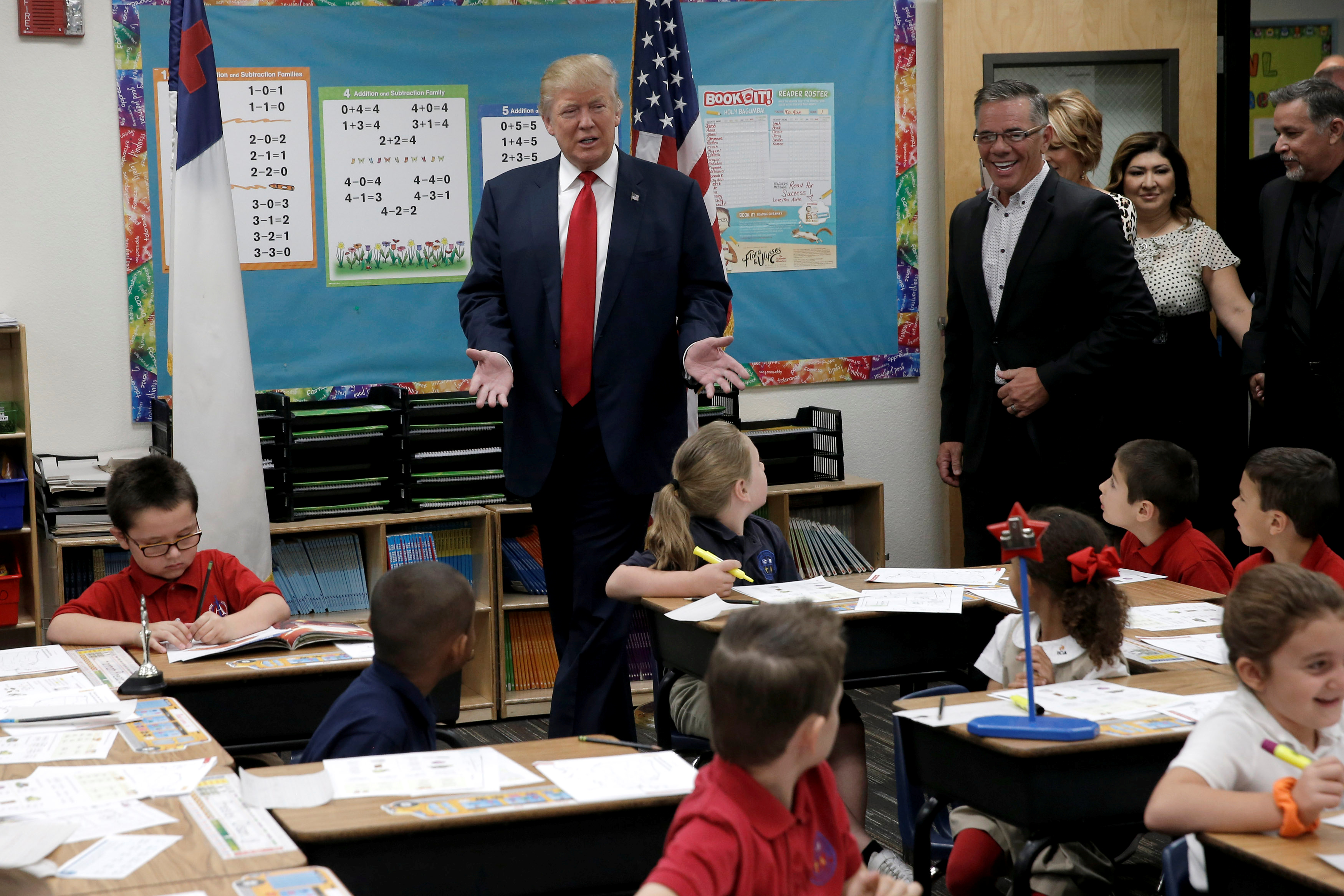What will President Trump mean for America's schools?
Our teachers and students may be in for some changes


A free daily email with the biggest news stories of the day – and the best features from TheWeek.com
You are now subscribed
Your newsletter sign-up was successful
During the presidential campaign, the candidates talked about a lot of things: immigration, jobs, health care, national security. Meanwhile, education didn't get much airtime. But what will a Donald Trump presidency mean for the country's teachers, families, and students?
While it's hard to tell exactly what Trump will do for education, we can try our best, based on what we know about Trump and what he has said, to read the tea leaves.
Curriculum
The Week
Escape your echo chamber. Get the facts behind the news, plus analysis from multiple perspectives.

Sign up for The Week's Free Newsletters
From our morning news briefing to a weekly Good News Newsletter, get the best of The Week delivered directly to your inbox.
From our morning news briefing to a weekly Good News Newsletter, get the best of The Week delivered directly to your inbox.
What might education under Trump mean for the actual content we teach in schools? Like many Republicans, Trump wants to wrangle education away from the federal government and give control back to the states. He has said he is in favor of repealing Common Core practices — a set of academic standards in mathematics and English language arts/literacy that outline what a student should know and be able to do at the end of each grade — but this is unlikely. Most states already took Common Core apart and created their own standards, which means it's already under local control. That means what's taught won't change much, if at all.
While we might not see a huge change in curriculum, we may see a change in other school programs like free and reduced lunches, which could be cut back or eliminated altogether.
Choosing a school
"As your president, I will be the nation's biggest cheerleader for school choice," Trump says on his website. "I want every single inner city child in America who is today trapped in a failing school to have the freedom — the civil right — to attend the school of their choice. I understand many stale old politicians will resist. But it's time for our country to start thinking big once again. We spend too much time quibbling over the smallest words, when we should spend our time dreaming about the great adventures that lie ahead."
A free daily email with the biggest news stories of the day – and the best features from TheWeek.com
Trump wants to ensure parents have more control over where their kids go to school. He has said he wants to take $20 billion in federal funding to set up block grants for states to use in helping low-income families. Though he initially said this money could be controlled locally, he is now saying that he wants it to be used for more school choice. This could mean a surge of new charter schools opening, or that current schools will have more applicants. But it does not guarantee that these students will get into the school of their choosing.
School civil rights
One area of education that Trump will probably try to change is civil rights. Obama created stringent laws around things like school discipline and the rights of transgender children. Given Trump's interest in wrangling control from the federal government, he might make it easier for states and local districts to regulate these rules for their schools.
It is difficult to say if this would be good or bad. Much of the controversy for more stringent civil rights laws stems from people letting their inherent biases against different racial, religious, and cultural groups influence their disciplinary methods. To fix this bias, a great deal of money was granted to schools for professional development and training to ensure civil rights for students regardless of background. Without this support, it is possible that people would be allowed to fall back on their biases, which could mean higher suspension rates for children of immigrants, for example.
Trump has said he supports letting transgender people use the bathroom of their choosing, but local control by states may not agree with him. Local control also means disciplinary practices could vary widely from state to state.
How much will America have to pay?
Trump has said he plans to cut out the Department of Education altogether. If this happens, what does it mean for the local tax burden? If cutting the department also means cutting federal funds, schools could lose roughly $15 billion in Title I funds they currently use to help educate at-risk students, more than $12 billion for students with special needs, and some $29 billion in Pell Grants to help low-income kids pay for college. These initiatives would then need to be funded by some other means, or dropped altogether.
In September 2016, the Center for American Progress Action Fund found that if the Department of Education were dissolved, "over 490,000 teacher positions could be eliminated — 14 percent of K–12 public school teachers nationwide ... This would have a terrible effect on the U.S. economy. The loss of that many jobs would be like UPS — one of the country's largest employers, with over 350,000 American workers — going out of business."
Kimberley Moran is a freelance writer and gifted and talented teacher living in Maine. Her writing has also appeared at GOOD, MarieClaire.com, Noodle.com, MiddleWeb, and other outlets.
-
 How to Get to Heaven from Belfast: a ‘highly entertaining ride’
How to Get to Heaven from Belfast: a ‘highly entertaining ride’The Week Recommends Mystery-comedy from the creator of Derry Girls should be ‘your new binge-watch’
-
 The 8 best TV shows of the 1960s
The 8 best TV shows of the 1960sThe standout shows of this decade take viewers from outer space to the Wild West
-
 Microdramas are booming
Microdramas are boomingUnder the radar Scroll to watch a whole movie
-
 The billionaires’ wealth tax: a catastrophe for California?
The billionaires’ wealth tax: a catastrophe for California?Talking Point Peter Thiel and Larry Page preparing to change state residency
-
 Bari Weiss’ ‘60 Minutes’ scandal is about more than one report
Bari Weiss’ ‘60 Minutes’ scandal is about more than one reportIN THE SPOTLIGHT By blocking an approved segment on a controversial prison holding US deportees in El Salvador, the editor-in-chief of CBS News has become the main story
-
 Has Zohran Mamdani shown the Democrats how to win again?
Has Zohran Mamdani shown the Democrats how to win again?Today’s Big Question New York City mayoral election touted as victory for left-wing populists but moderate centrist wins elsewhere present more complex path for Democratic Party
-
 Millions turn out for anti-Trump ‘No Kings’ rallies
Millions turn out for anti-Trump ‘No Kings’ ralliesSpeed Read An estimated 7 million people participated, 2 million more than at the first ‘No Kings’ protest in June
-
 Ghislaine Maxwell: angling for a Trump pardon
Ghislaine Maxwell: angling for a Trump pardonTalking Point Convicted sex trafficker's testimony could shed new light on president's links to Jeffrey Epstein
-
 The last words and final moments of 40 presidents
The last words and final moments of 40 presidentsThe Explainer Some are eloquent quotes worthy of the holders of the highest office in the nation, and others... aren't
-
 The JFK files: the truth at last?
The JFK files: the truth at last?In The Spotlight More than 64,000 previously classified documents relating the 1963 assassination of John F. Kennedy have been released by the Trump administration
-
 'Seriously, not literally': how should the world take Donald Trump?
'Seriously, not literally': how should the world take Donald Trump?Today's big question White House rhetoric and reality look likely to become increasingly blurred
